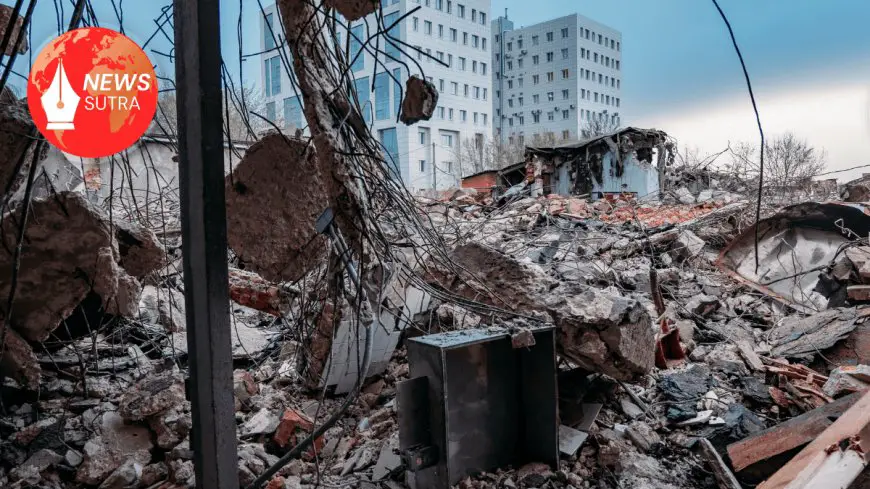Ballistic Missile Barrages and Hospital Strikes: Unpacking the Human Cost of Escalation in Israel
Recent Iranian missile strikes, including a direct hit on Israel’s Soroka Medical Center, have intensified fears over civilian safety. This article explores the human toll, casualty figures, public reaction, and legal implications under international law.

Introduction: When Warfare Crosses a Humanitarian Line
In one of the most alarming escalations in recent Middle Eastern hostilities, Iranian ballistic missile barrages have struck civilian infrastructure in Israel, including a direct hit on Soroka Medical Center in Be’er Sheva. As regional tensions spiral, the consequences are no longer confined to military targets—they are now being felt acutely by civilians, doctors, and aid workers.
The latest attacks have raised urgent international concerns about the targeting of medical facilities, prompting accusations of potential war crimes and calls for accountability under international humanitarian law. Beyond the military and geopolitical calculus, there is a deeper tragedy unfolding—one of civilian suffering and institutional paralysis in the very spaces meant to save lives.
What Happened: The Soroka Medical Center Strike
Timeline of Events
On June 20, 2025, in a coordinated attack launched from within Iranian territory, a volley of ballistic missiles and drone swarms targeted southern and central Israel. Among the impacted locations was the Soroka Medical Center, a major trauma and teaching hospital serving more than 1 million people in the Negev region.
According to the Israeli Ministry of Health, a missile struck a parking structure adjacent to the hospital’s emergency wing, causing a partial collapse and injuring both patients and hospital staff. Though the main building was not hit directly, the impact severely disrupted hospital operations.
Casualty Figures and Civilian Impact
Confirmed Casualties as of June 22:
-
6 civilians killed, including 2 children and a paramedic on duty
-
Over 45 injured, 17 in critical condition
-
Emergency services in the region diverted, delaying response times for unrelated incidents
Several ambulances and emergency vehicles parked outside the hospital were destroyed, and the nearby pediatric wing had to be evacuated due to structural concerns.
Doctors at Soroka described the scene as “chaotic,” with patients being treated in hallways and parking lots, while medical personnel worked in protective gear amid ongoing air-raid sirens.
Public Reaction in Israel: Anguish and Resilience
The hospital strike has triggered a wave of public outrage across Israel.
Protests erupted in Tel Aviv and Jerusalem, where demonstrators held vigils outside health ministry offices demanding better protection for civilian infrastructure. Social media platforms were flooded with photos of bloodied hospital hallways and emotional pleas from doctors working under siege-like conditions.
Prime Minister Benjamin Netanyahu condemned the attack as “a direct assault on humanitarian principles,” vowing that “Israel will respond not only with strength but with moral clarity.”
Meanwhile, communities in the south have begun organizing volunteer medical camps and launching crowdfunding campaigns to rebuild damaged facilities and provide trauma care to affected families.
Global and Legal Implications: A War Crime?
The strike on Soroka—and others like it—has sparked global condemnation.
The World Health Organization (WHO) issued a formal statement expressing “grave concern” over attacks on health facilities, reminding all parties of their obligations under the Geneva Conventions, which protect hospitals and medical personnel in conflict zones.
Under International Humanitarian Law (IHL):
-
Attacks targeting hospitals that are not being used for military purposes constitute war crimes
-
Civilian infrastructure must be clearly distinguished from military objectives
-
Even when dual-use facilities are suspected, proportionality and precautionary measures must be observed
The United Nations Human Rights Council has called for an emergency session to assess the situation, with some member states pushing for a formal investigation into possible violations by Iranian forces.
Broader Context: Why Civilians Are Being Pulled Into the Crossfire
The escalation between Iran and Israel follows months of proxy tensions and border skirmishes, particularly in the context of ongoing conflicts involving Hezbollah and other regional militias. But recent direct attacks mark a new phase in the conflict—one where civilian infrastructure is no longer collateral, but central.
Strategists note that missile technology has become more precise, which makes civilian strikes less likely to be accidental. This has raised fears that such attacks are calculated pressure tactics aimed at undermining public morale and overwhelming emergency services.
Humanitarian Fallout and Operational Disruption
The damage to Soroka and surrounding infrastructure has already triggered:
-
Cancellations of elective surgeries and treatments
-
Diversions of trauma patients to overwhelmed regional hospitals
-
Suspension of outpatient services for at least 7 days
Moreover, mental health experts are warning of a rising wave of psychological trauma, particularly among children and first responders. According to the Israel Trauma Coalition, more than 2,000 individuals in the region have already sought psychological first aid since the attack.
What Comes Next: Calls for Accountability and Protection
The incident has reignited calls for international mechanisms to better protect civilian infrastructure in conflict zones. Proposals on the table include:
-
A no-strike registry coordinated by the UN to flag protected facilities like hospitals and schools
-
Independent monitoring bodies to assess damage and establish legal liability
-
Increased deployment of early-warning systems in conflict-prone areas
Human rights organizations are also urging neutral third-party investigations, warning that impunity in such cases will only embolden further violations.
Conclusion: A Line Crossed in Modern Warfare
The missile attack on Soroka Medical Center is not just a footnote in a broader geopolitical saga—it is a humanitarian flashpoint. It reflects a dangerous erosion of norms that, until now, offered some protection to the most vulnerable during war.
As global powers weigh diplomatic and military responses, one thing is clear: when hospitals become battlefields, the entire notion of civilian immunity begins to collapse.
The world must now decide whether this was an anomaly—or the beginning of a darker chapter in 21st-century warfare.














